Melissa Terras Launches Two Open Access Books on Academia in Children’s Literature
By Rudolf Ammann, on 26 October 2018
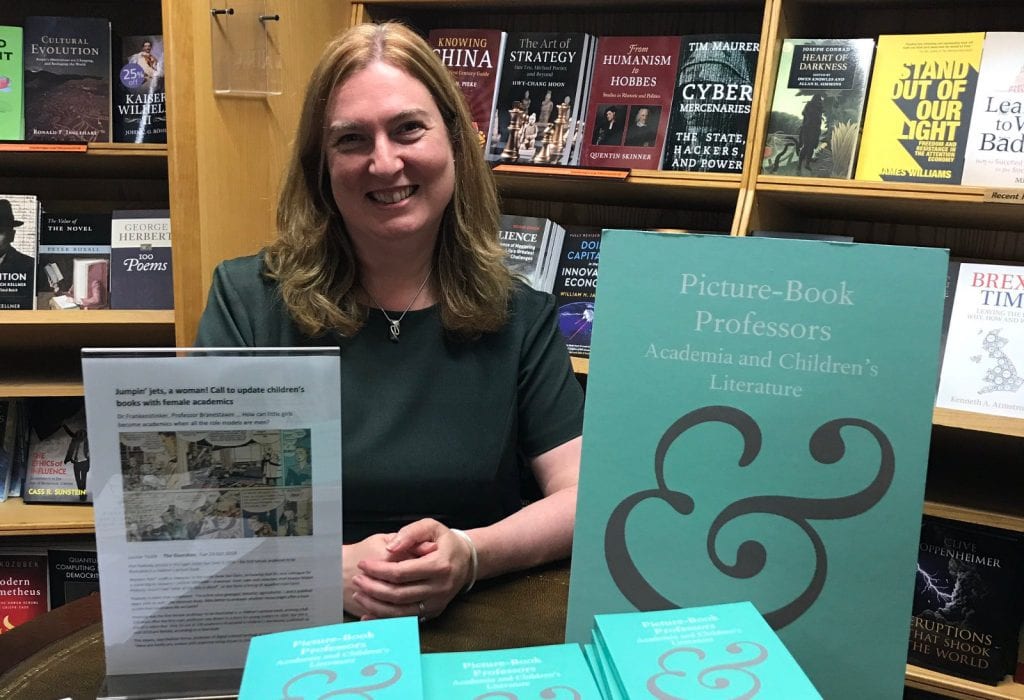
Earlier this week: Melissa Terras presents her work at the Cambridge University Press Bookshop in Cambridge. (Photo credit: Anne Welsh)
UCLDH’s co-founder and former director Melissa Terras launched two open-access books of hers during this year’s Open Access Week: Picture-Book Professors: Academia and Children’s Literature from Cambridge University Press and The Professor in Children’s Literature: An Anthology from Fincham Press.
In the research presented, Melissa studies the representation of academics in juvenile literature from the mid-nineteenth century to the present. She lays out her findings in an academic monograph [free PDF] and supplements this work with an anthology of selected out-of-copyright works [free PDF].
Melissa’s research has been covered by Times Higher Education [subscription required] and The Guardian.
In a post today Melissa notes on open access book publishing in the humanities:
We are at a juncture where the sands are shifting: the major funders and government bodies are moving towards requirements for open access monographs. We don’t have a choice; we have to embrace these requirements, but there is a lot of work yet to be done about who will pay the costs for production. I believe that most universities could afford to absorb the costs of open access monograph production, much in the same way that they pay for lab costs or scientific equipment: it should be viewed as a centrally borne cost necessary for creating and sharing academic knowledge. It shouldn’t happen that individuals are asked to pay these costs themselves, as that is untenable. I can see people are concerned about how their personal costs will be met — and it is up to universities and presses to grapple with this. The danger is the open access premium: that only those who can afford to publish in open access will reap the benefits of having their work made accessible to a wide audience, and we have to keep our eyes open to that, as the academy needs diverse voices (as Picture-Book Professors and The Professor in Children’s Literature say!)
UCLDH Lunch-hour lectures: Star Wars and Hillary Clinton
By Lucy Stagg, on 28 September 2018
UCLDH is delighted to have two team members giving UCL Lunch-Hour Lectures this term.
Team member Dr. Rachele De Felice will be discussing ‘What’s Really Going On in Hillary Clinton’s Emails?’ on 16 October 2018. Dr De Felice will explore questions of manners, who gets stuck with the boring tasks, and what kind of boss Clinton is.
Dr Oliver Duke-Williams will speak on 27th November on ‘What Can the ONS Longitudinal Study Tell Us about Time Travel and about the Force?’ Dt Duke-Williams will outline what the study is and explain how to apply to use it by drawing on two examples: the film Back To The Future; and the Star Wars films.
The UCL Lunch-Hour lectures are free and open to the public, but booking is recommended. Lectures are also live streamed. The UCL Events page explains:
Lunch Hour Lectures are an opportunity for anyone to sample the exceptional research work taking place at UCL, in bite sized chunks. Speakers are drawn from across the university, and lectures frequently showcase new research and recent academic publications.
Video abstract on imaging work within mummy cartonnage
By Lucy Stagg, on 24 August 2018
The journal Heritage Science has released a video abstract of the paper UCLDH team members co-authored on advanced imaging for investigating inscribed papyrus in mummy cartonnage.
The full original paper is also available to read online. The co-authors are all part of the Deep Imaging research project team.
PKU Digital Humanities Forum 2018
By Simon Mahony, on 28 July 2018
When we think about Digital Humanities from our base here at UCL, it is all too easy to think about the anglophone world and the predominance of Western Europe and North America, and particularly the UK, USA and Canada. So, it was good to see this year’s ADHO conference being held in Mexico City at UNAM (DH2018) as a move to a more global digital humanities. With its theme, “PUENTES/BRIDGES”, it was also pleasing to see to that the organisers had taken a multi-lingual approach with proposals, presentations and conference material in languages other than just English. This was the first ADHO conference in Latin America and the global south.
I was very pleased to be able to visit UNAM, Isabel Galina Russell and the National Library last year and so I was not too disappointed in not being able to attend DH2018 – although I did miss networking and catching up with many DH friends and colleagues. Instead, two weeks earlier, I took the opportunity to move beyond the anglophone world myself and presented a paper at the main DH event in China, held for the third time at UCL’s strategic partner Peking University (PKU).
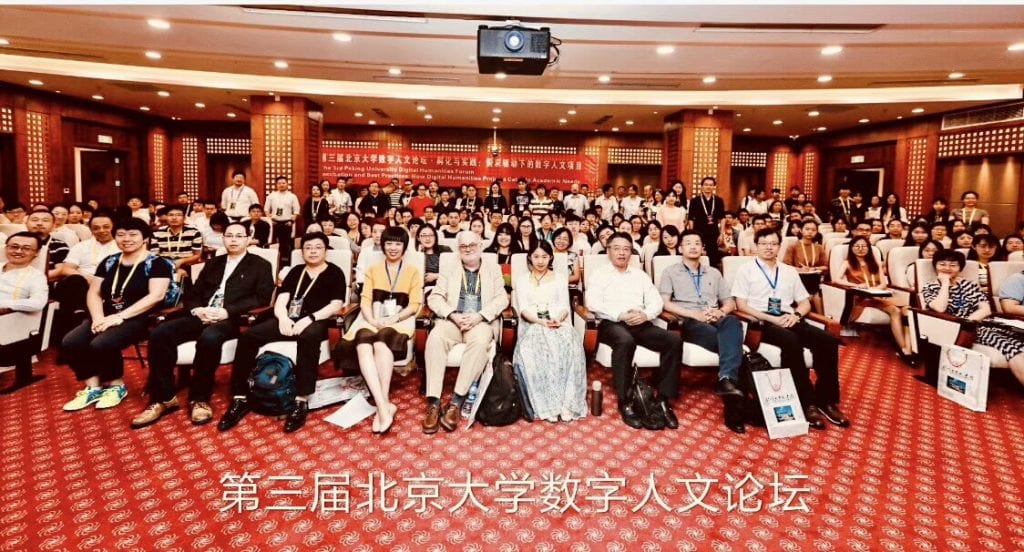
The official Forum audience photo
The 3rd Peking University Digital Humanities Forum had the theme: ‘Incubation and Application: How Digital Humanities Projects Cater to Academic Needs’. I had the full experience of what it must be like to attend an English speaking conference if you do not speak the language – everything was in Chinese with no translations. I was the only ‘foreigner’ (non-Chinese) at the Forum which also had several speakers from Taiwan and Chinese scholars based in the USA.
Although mine was the only non-Mandarin presentation, there were a surprising number of familiar words in many of the others (metadata, big data, linked data and several others, again pointing to the dominance of the English language in our field). My presentation was in collaboration with my Chinese PhD student, Jin Gao (who could not attend as she was presenting her work at DH2018), and benefited from her translations to enable bilingual (English and Mandarin) slides to aid the audience.
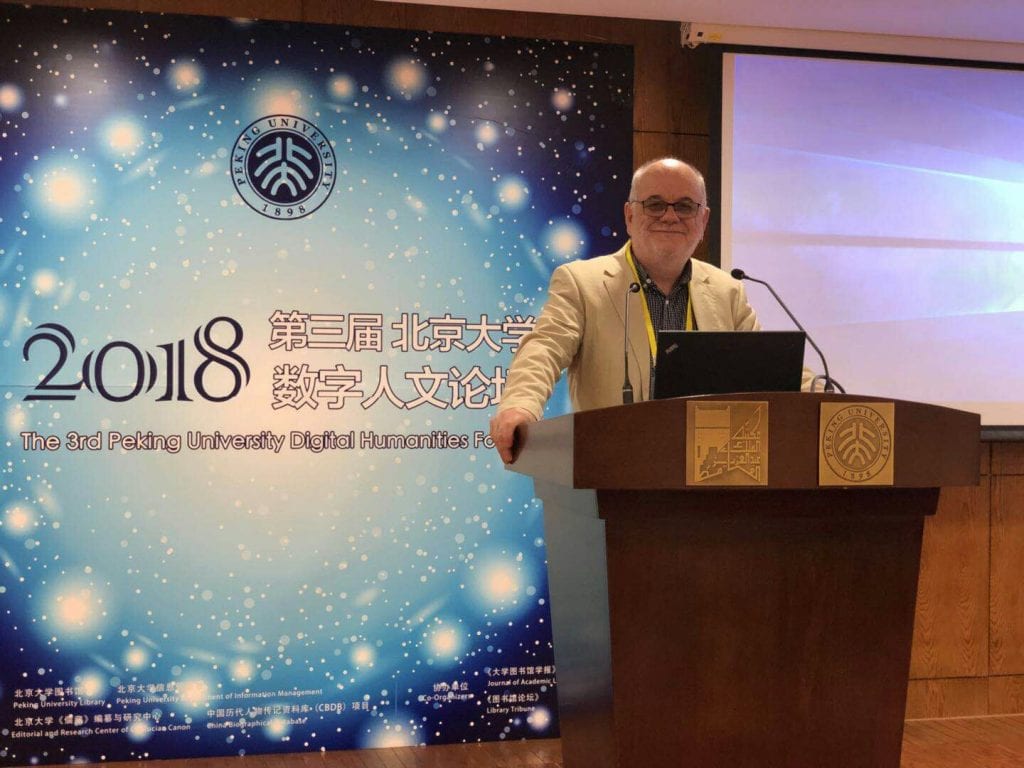
On the podium at the PKU DH Forum 2018
I was not alone and so all was well; there were many friends there and hosts from my earlier networking visits to Beijing, Shanghai, Wuhan and Nanjing – I was not short of company. In addition, the day before the Forum I had been invited to give a presentation to the DH group at Renmin (The People’s) University in the School of Information Resource Management, following their visit to UCL DIS last year.
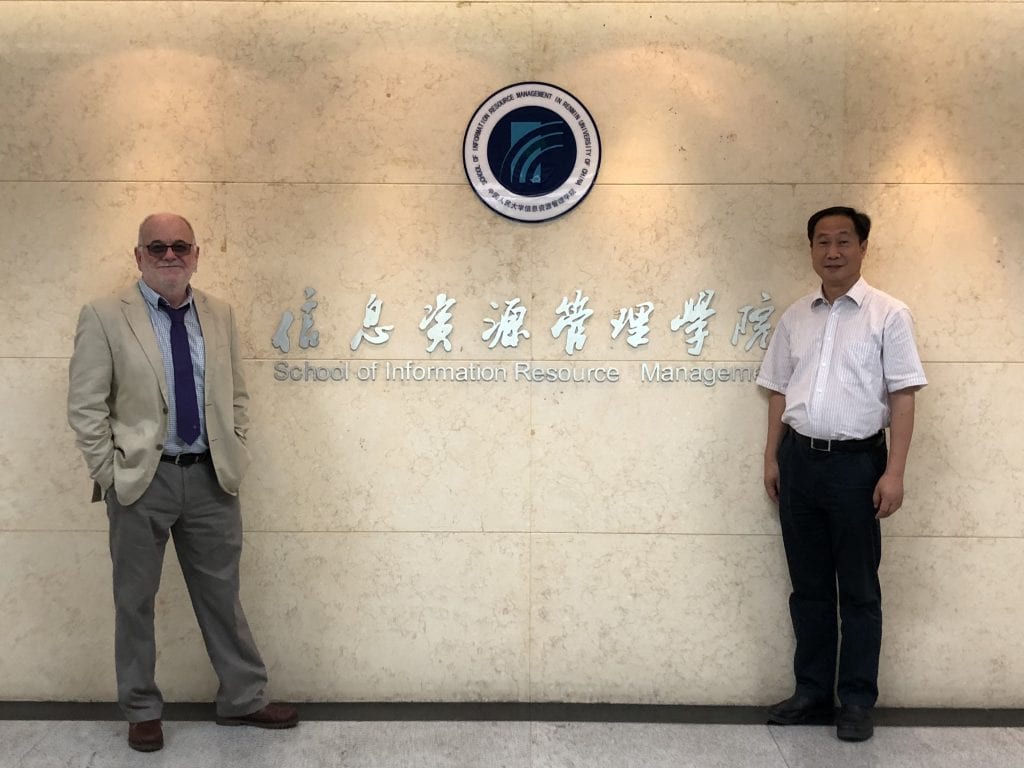
Renmin University, School of Information Resource Management
The delegates from Renmin very kindly picked me up from my hotel and dropped me back after dinner – always worrying that this ‘foreigner’ might get lost. I explained that I was a seasoned traveler (and sailor) so there was no problem, except perhaps crossing the road! Renmin is not far from PKU and I had strategically picked a hotel midway on the road that linked the two. PKU is a large and sprawling campus and so I was very grateful for being so well looked after. For anyone wondering about visiting China, their hospitality is exceptional and they are very welcoming to foreign visitors.
There was, in addition, a DIS student from the Information Science programme at the Forum and a PhD candidate from King’s Department of Digital Humanities who between them, together with their phone camera translations of the slides, updated me with what was being said.
The visit to PKU was rounded off with a talk in the PKU Faculty of Social Sciences.

The prize winning poster from my talk at Renmin – now on my office wall
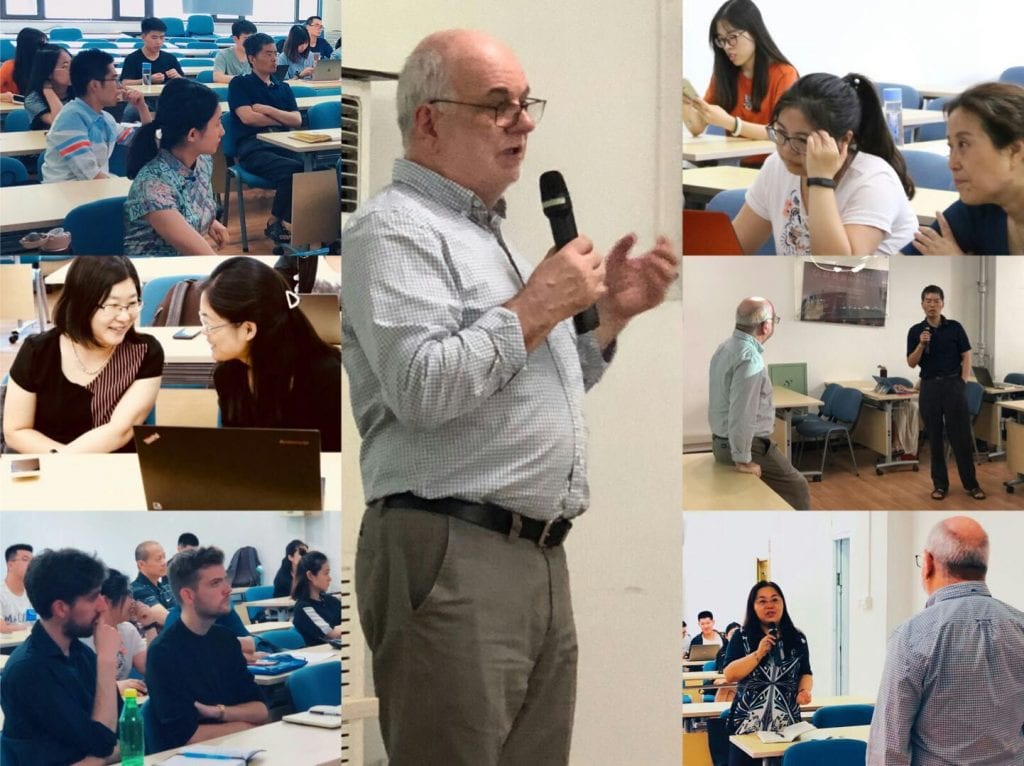
Speaking and being interrogated at Renmin
And, of course and as always, the Beijing visit was completed with a dinner in the warm company of former students.
Revival of Chinese Intangible Cultural Heritage
By Simon Mahony, on 9 July 2018
I was very pleased to be able to accept an invitation to speak at the 2018 World Historical & Cultural Cities Expo in Nanjing in May. The organisers (Traditionow – Xihan Action) have a strategic partnership with UNESCO to protect the World historical & cultural cities and their cultural heritage. Xian Action is an NGO working on the protection and promotion of intangible heritage, especially handcraft technique, knowledge and recreation.
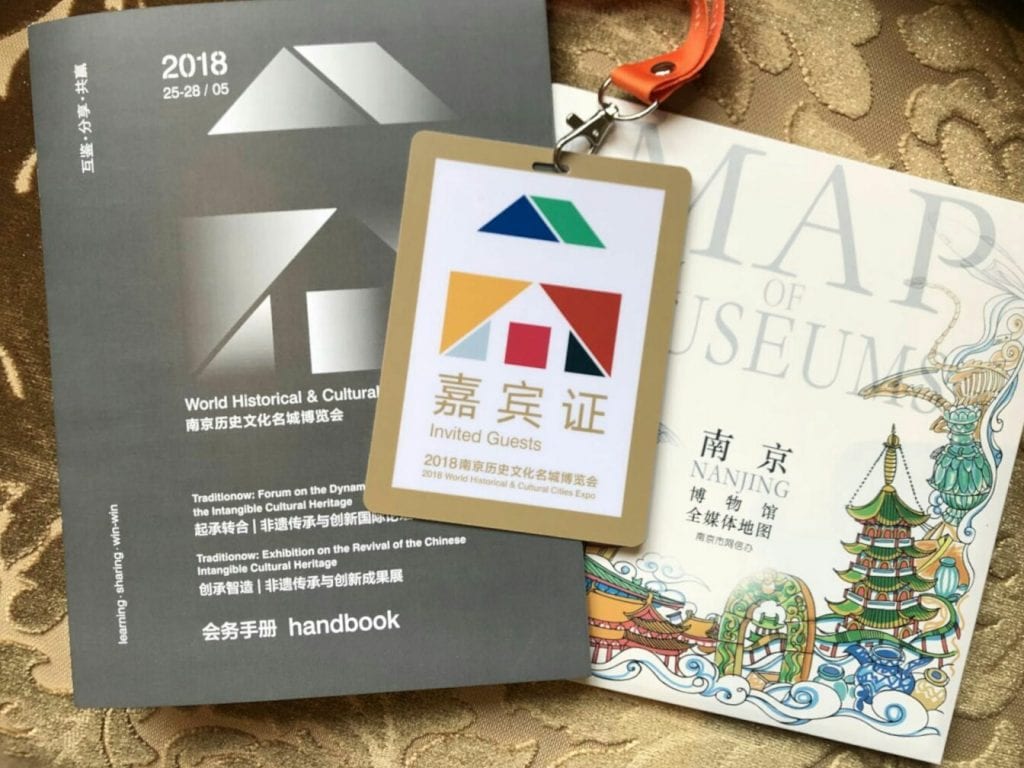
2018 World Historical & Cultural Cities Expo
There is a danger that in an industrialised and fast developing society that traditional crafts and skills will be lost. This two-day event, Forum of Dynamic Inheritance of Intangible Cultural Heritage, had presentations from academics, craft practitioners and entrepreneurs, all interested in cultural heritage and its preservation. I was able to draw on UCLDIS colleagues’ oral history research, emphasising the importance of talking to craft practitioners to protect the skill’s memory; I used the traditional craft of paper-cutting as a case study and specifically the unusual ‘black paper cutting’ from the Nangou Village where the older inhabitants live in caves decorated with their work.
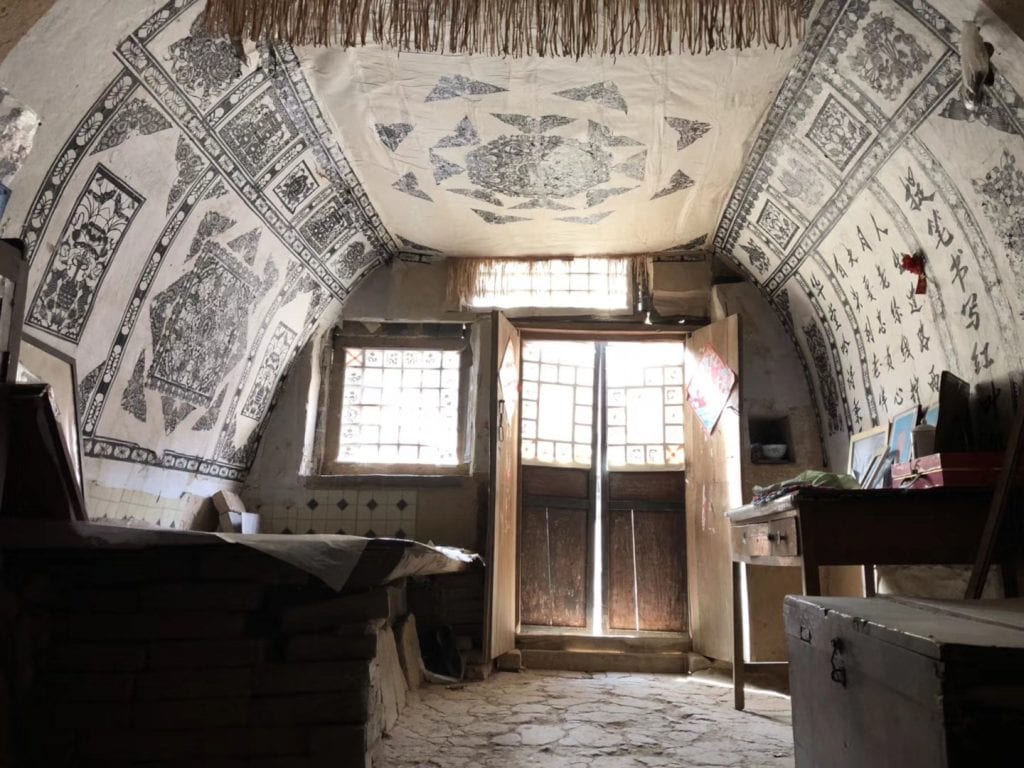
Black paper cutting at Nangou Village. Image copyright Kong Qiongpei (China Academy of Art) and used here with permission.
As part of the event, there was a really inspiring exhibition of traditional craft work, which also included modern interpretations of traditional design work.

Traditionow
This trip allowed another opportunity to enjoy the hospitality of Nanjing University and the Digital Humanities research group there. This included a guest lecture to staff and students in the Faculty of Arts and Cultural studies as well as meetings in their Institute of Advanced Studies of Social Science and Humanities to discuss possible future collaborations and further visits.
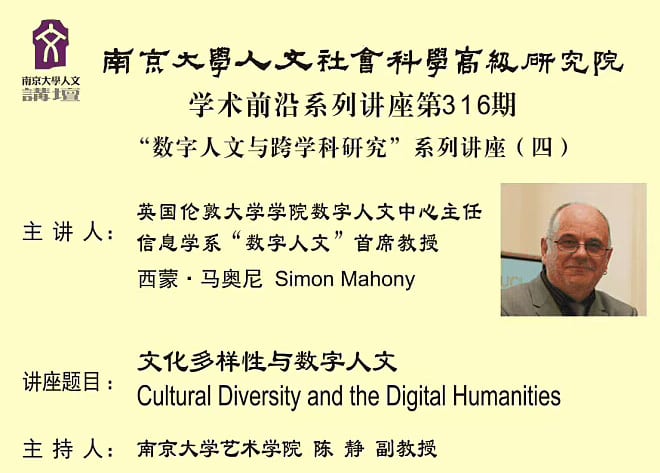
Poster for Nanjing University guest lecture
Reflectance Transformation Imaging Training Courses available
By Lucy Stagg, on 6 July 2018
UCLDH are delighted to be offering three 4-day RTI training courses this summer. There are still a few spaces left on each of the dates – book now to avoid disappointment!
During the course you will cover the complete RTI digital imaging work flow, from planning to archiving and publication. You will gain practical knowledge about equipment, image capture setups, and software, using examples from different areas of cultural heritage. You will follow a step-by-step guide through processing the images and how to use different viewing modes to examine details of the image.
These courses are perfect for: museum, library, and photographic staff working in conservation and education; archaeologists, historians, and anyone working with collections; anyone interested in Reflectance Transformation Imaging technology and its practical application.
You can find dates and booking details on the UCLDH website.
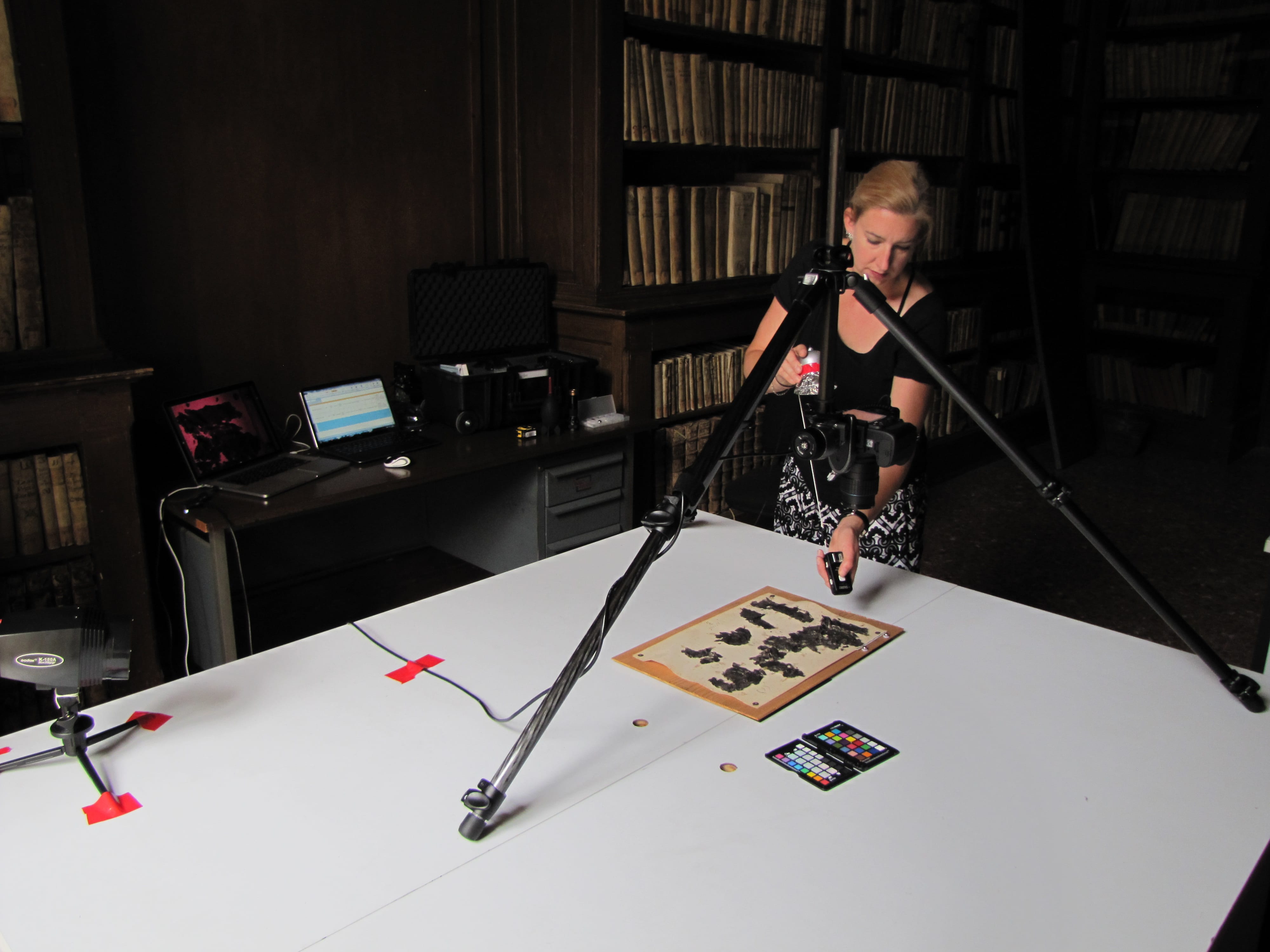
Dr. Kathryn Piquette undertaking RTI
UCLDH Susan Hockey Lecture 2018
By Lucy Stagg, on 22 June 2018
Recently we had the pleasure of meeting Professor Carlo Meghini, who came to UCL on 30th May to give the fourth Susan Hockey Lecture in Digital Humanities.
The aim of this annual public lecture series is to celebrate and promote work in Digital Humanities: the application of computational techniques within the arts, humanities, culture and heritage. Prof Meghini spoke on ‘What can be said, can be said clearly? The role of ontologies in the Digital Humanities’.
The lecture was well attended, with over 100 people registered, and attendees had plenty to discuss afterwards over a glass of wine.
The lecture was filmed and is now available to view on the UCLDH website.
Digital Humanities in Wuhan, Shanghai and Nanjing
By Simon Mahony, on 8 May 2018
Within the UK academic calendar, it is probably the Easter break that affords the longest uninterrupted time for travel and this year I took the opportunity to complete my series of talks and research meetings enabled by the UCL Global Engagement fund.
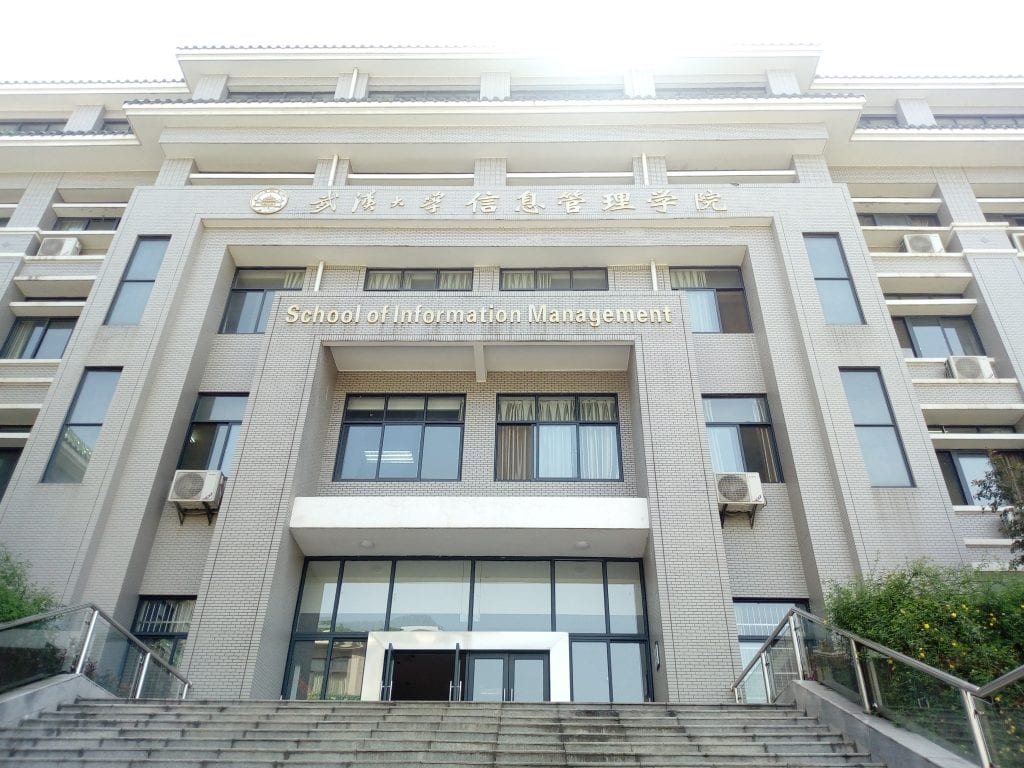
Wuhan University: School of Information Management
This began with a visit to the University of Wuhan (WHU) which is home to the first DH Centre established in China (2011). Professor Wang at the Department of Publishing Science hosted me for the visit which included a tour of the university and a guest lecture to staff, students and Faculty (details and poster at this link) followed by a lecture for their sophomore Publishing Science students on Designing for Online Publishing.
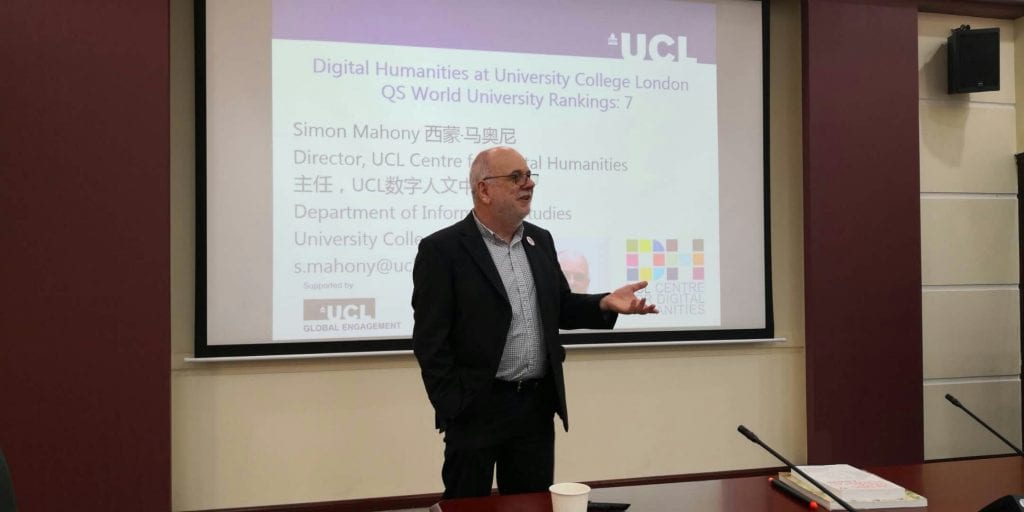
Wuhan University guest lecture
WHU has a huge sprawling campus adjacent to the East Lake which is built on and around a hill with a castle, which was the old library and is now the student union and student accommodation – lucky students, at the top.
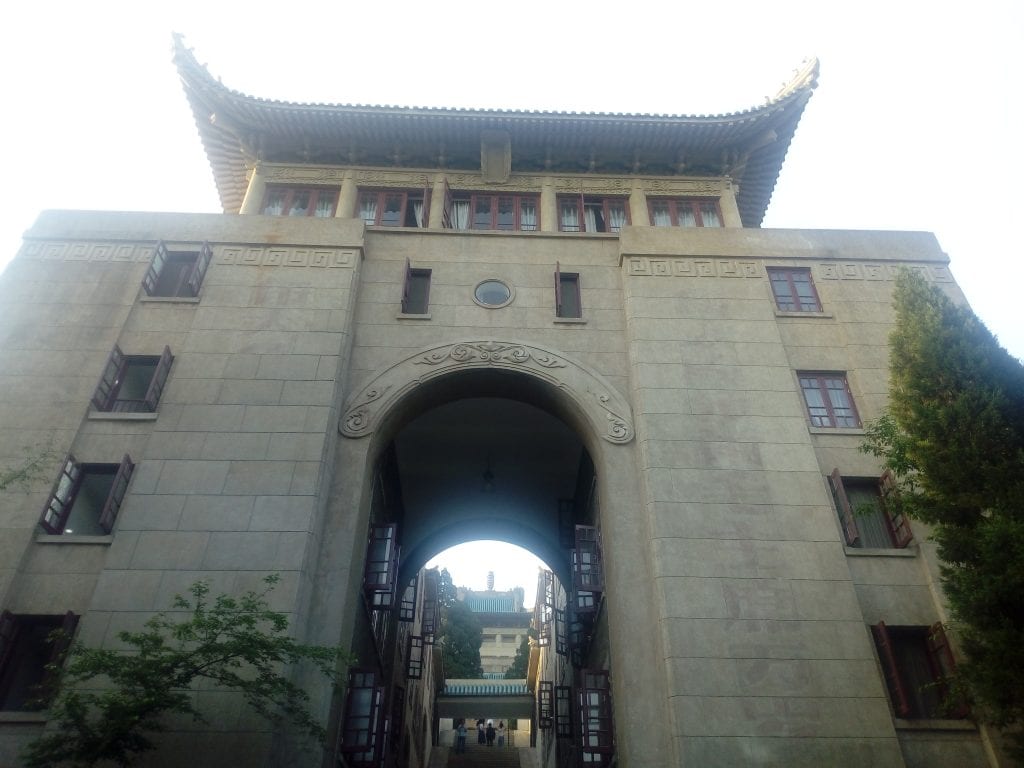
Wuhan University Castle
Stopping off at Shanghai enabled me to visit friends and deliver two guest lectures at the China Academy of Art, Shanghai Institute of Design. I enjoyed their usual open hospitality and met with visiting professors and students from HFBK Hamburg who were setting up an exhibition of their work on design.
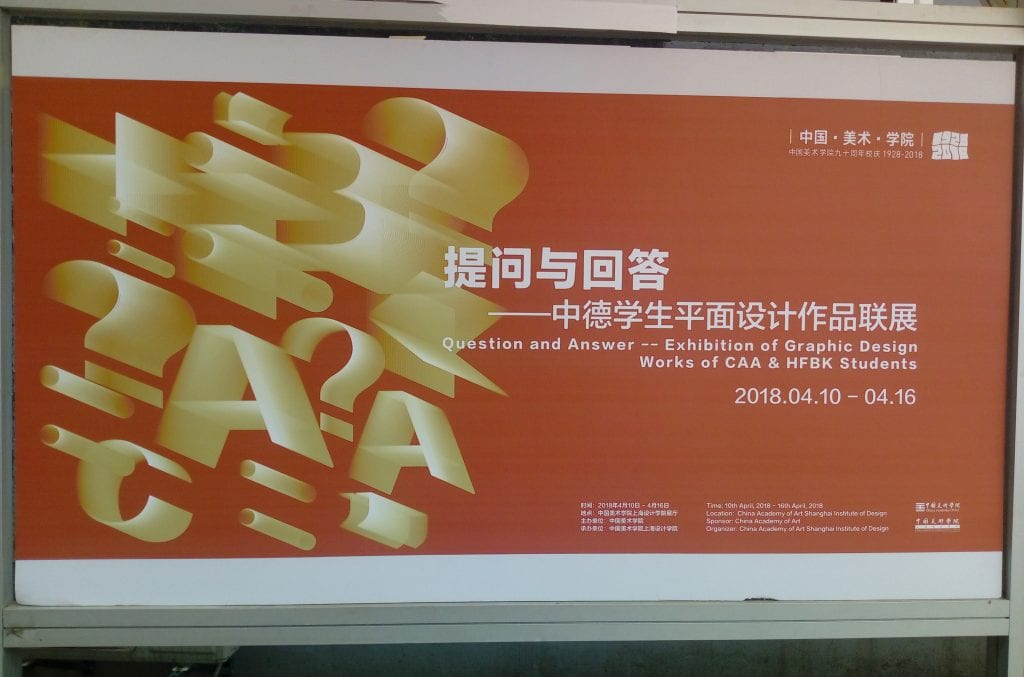
Design exhibition at CAA, SID
This trip also allowed me to accept an invitation, received at my January visit, from the Digital Humanities team at the Shanghai Library to deliver a guest lecture on UCLDH and our research here at UCL as part of their research seminar series.
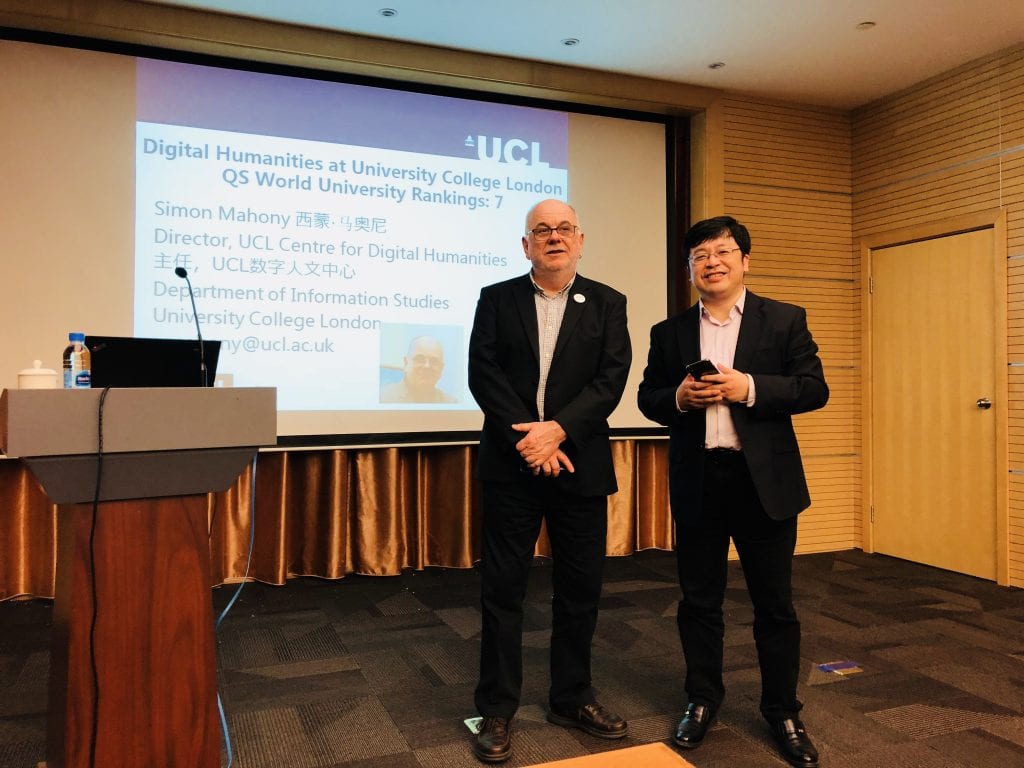
Shanghai Library guest lecture
The final stop on this tour was at the University of Nanjing (NJU) to give a guest lecture to faculty and graduate students. This was followed by discussions about teaching and research at their newly established (2017) DH Centre, which is located in their History Department with close links to NJU Computer Science. The visit was rounded off with an introduction to the dedicated DH GIS lab there and a demonstration of their keynote GIS (such as Six Dynasty Archeology) and 3D projects.
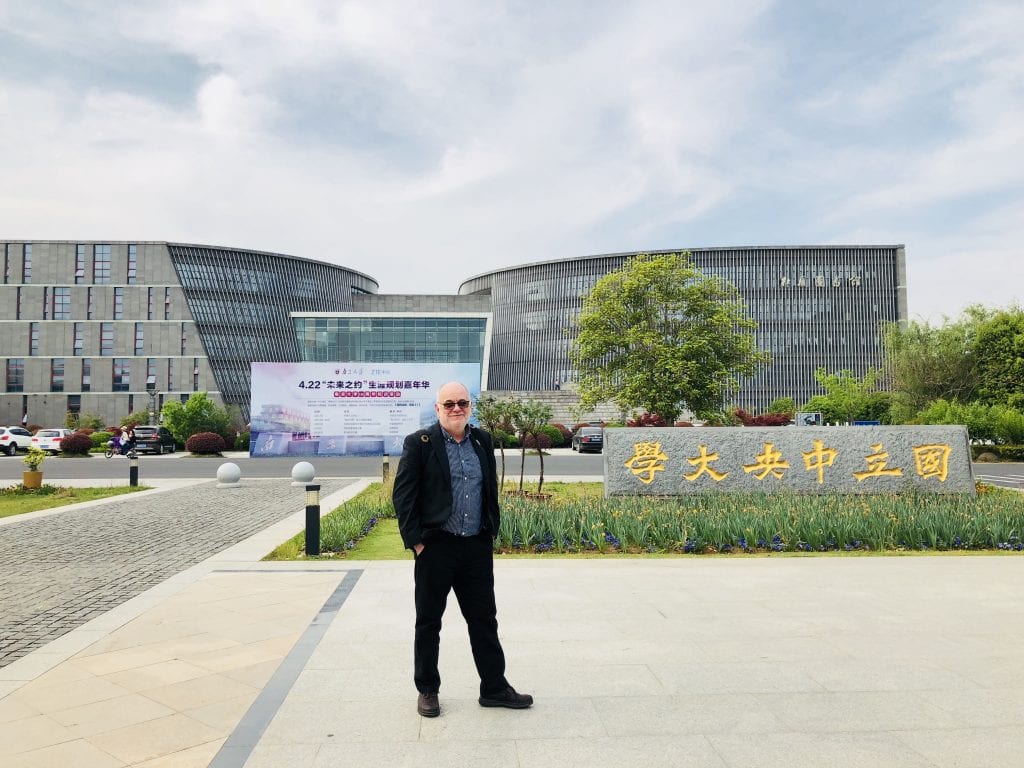
Nanjing University Library
The support, gratefully received from UCL’s Global Engagement scheme, financed the flights which enabled these meetings, discussions and lectures to take place (as well as my earlier visit and workshop in January). The trip facilitated new connections and possibilities in the areas of teaching and research between UCLDH and DH Centres in China. In addition to this, the funding has enabled me to employ a current UCL DIS research student, as part of the UCL Connected Curriculum initiative, to translate and adapt the teaching materials used for the lectures and workshops; these will be released as bilingual (English and Chinese) OERs on the new UCL Open Educational Repository later this summer.
Digital Classicist, London Summer seminar series 2018 programme
By Simon Mahony, on 4 May 2018
The Digital Classicist London 2018 seminar programme is now confirmed and published online. The seminar series this year addresses the tension between standardisation and customisation in digital and other innovative and collaborative classics research. The topic encompasses all areas of classics, including ancient history, archaeology and reception (including cultures beyond the Mediterranean). Seminars will be pitched at a level suitable for postgraduate students or interested colleagues in Archaeology, Classics, Digital Humanities and related fields.
Institute of Classical Studies
Fridays at 16:30 in room 234*, Senate House south block, Malet Street, London WC1E 7HU
(*except June 1 & 15, room G21A)
ALL WELCOME
Seminars will be screencast on the Digital Classicist London YouTube channel, for the benefit of those who are not able to make it in person.
Discuss the seminars on Twitter at #DigiClass.
| Jun 1 | Zena Kamash (Royal Holloway) | Embracing customization in post-conflict reconstruction (abstract) | (G21A) |
| Jun 8 | Thibault Clérice (Sorbonne) et al. | CapiTainS: challenges for the generalization and adoption of open source software (abstract) | |
| *Jun 15 | Rune Rattenborg (Durham) | Further and Further Into the Woods: Lessons from the Crossroads of Cuneiform Studies, Landscape Archaeology, and Spatial Humanities Research (abstract) | (G21A) |
| Jun 22 | Joanna Ashe, Gabriel Bodard, Simona Stoyanova (ICS) | Annotating the Wood Notebooks workshop (abstract) | |
| Jun 29 | Monica Berti, Franziska Naether (Leipzig) & Eleni Bozia (Florida) | The Digital Rosetta Stone Project (abstract) | |
| Jul 6 | Emma Bridges (ICS) and Claire Millington (KCL) | The Women in Classics Wikipedia Group (abstract) | |
| Jul 13 | Elizabeth Lewis (UCL), Katherine Shields (UCL) et al. | Presentation and discussion of Sunoikisis Digital Classics student projects | |
| Jul 20 | Anshuman Pandey (Michigan) | Tensions of Standardization and Variation in the Encoding of Ancient Scripts in Unicode (abstract) | |
| Jul 27 | Patrick J. Burns (NYU) | Backoff Lemmatization for Ancient Greek with the Classical Language Toolkit (abstract) |
UCLDH hosted BL Labs roadshow, April 2018
By Lucy Stagg, on 1 May 2018
UCLDH were pleased to host the British Library Labs team on 24th April for their 2018 roadshow. This is the third time UCLDH have hosted the BL Labs, and the success and popularity of the now annual event continues to grow, with over 70 people registered this year.
This year’s event included a series of presentations exploring the British Library’s digital collections, how they have been used in various subject areas such as the Humanities, Computer Science and Social Sciences and the lessons learned by working with researchers, including UCLDH team member Tessa Hauswedell who spoke about her project the “Oceanic Exchanges” Project:Tracing Global Information Networks In Historical Newspaper Repositories, 1840-1914.
The Roadshow showcased examples of the British Library’s digital content and data, addressed some of the challenges and issues of working with it, and how interesting and exciting projects have been developed via the annual British Library Labs Competition and Awards.
There was some good discussion around potential ideas of working with the Library’s data, and the UCLDH team look forward to hopefully seeing some of these projects come to fruition over the next few years!
 Close
Close


